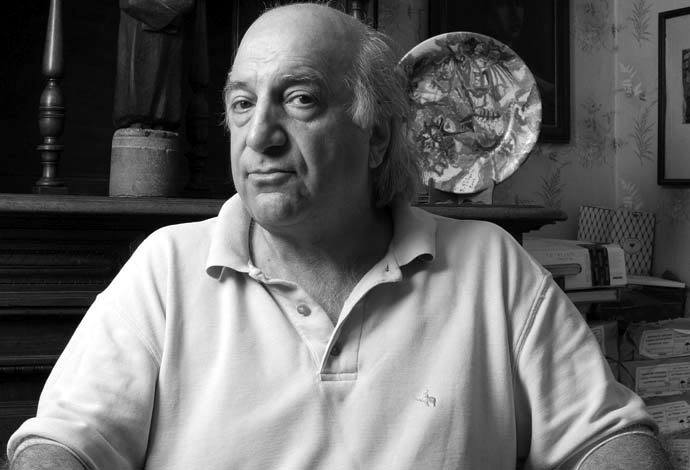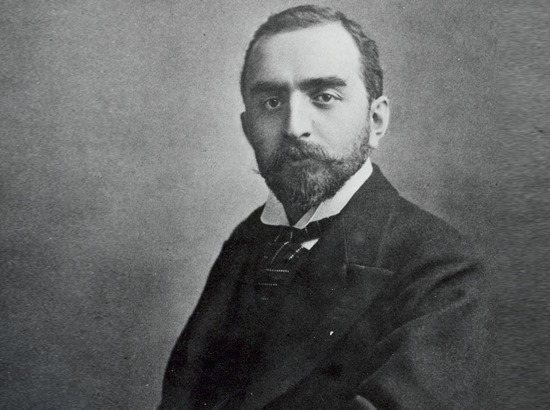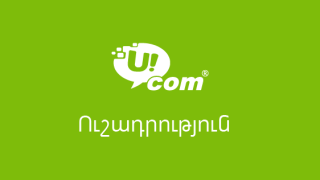“Baku’s Oil is Ours”

Instead of a preface
Twenty years have passed after the release of my book “National consciousness” in Yerevan in 1997. And although yet they don’t dare give the name of the author, by citing his words, something has changed in the national consciousness to a positive side, or an attempt is made to change.
The process of recovery of the nation is a lasting one. And not for the reason that we are rather conservative in our perception of the world, like any other survived nation under the absence of a national state, but of the point that inertial processes are rather intensive.
This is the way of development of any nation. However, the dynamics of people’s development should be followed. It needs to be brought up and directed, and not made living in anarchy of law, providing situational analysis to the country’s citizens, which demoralize the nation.
Thus, this is the way lie, dissimulation and corruption appear in the social system. However, there are some positive moments in people’s radical mentality (Armenia plus Diaspora).
Accordingly, time has come to formulate the ideas around a crucial issue like: what’s that shape of Armenia’s state borders (configuration), where we could live and develop completely and safely?
Crucial and weak points of our consciousness will appear in the decision of this crucial issue. It’s necessary to show the roughest mistakes made during establishment of a national state, which they started to build yet in 1918, and which was deprived of security strategy. This is what the Second Republic was like. Now about the third one.
There are no even overviews of time regarding within which borders and in what kind of a changing world we’d implement our political will. How much can it cost us in time and money expression, as well as human and intellectual resources?
Will people, economies of Armenia and the Diaspora resist to this? How much is the price for the life of an Armenian, if until now we didn’t bury the 1.5 million victims of the Genocide?
Where will we appear, on the one hand, in the period of such rapid development of technologies, and, on the other hand, under the demographic boom of countries with hostile attitude towards Armenia?
There is legal life, and not everything is being decided in the offices. People’s will is also existent. Our demographic condition is more and more worsening. What goes on today with the life of the Armenians is extremely negative. When a peasant or a craftsman leaves the country, it’s a syndrome of decay of the society.
Peculiarity of Armenian migration is that it quickly fits into new ethno-state conditions, virtually being present in the Fatherland.
Armenia’s citizen doesn’t believe in justice, offered to him/her by the authorities and leaves the Fatherland. Like English historian Arnold Joseph Toynbee said, “The state decays with reduction of justice.”
We have become a nation of the Diaspora since 2000, 70% of the nation lives out of its ethnic or historical borders. Under these conditions it’s extremely difficult for the state to survive, but it should still develop.
Real resources of the abovementioned questions lack. The mechanism of empty, fake patriotism has been brought into operation. Mythicized consciousness of Armenians may again lead to irreparable implications. There is no sober calculation, and what is the most important, there is no desire to listen to the opposing side, seems like opponents are not daughters and sons of that very country. And this shows the low level of ideology of the leadership. At the same time, lie has violated the atmosphere of internal psychology.
We and they

And, however, real political analysis is not peculiar to our nation. We don’t perceive ourselves as subjects of history. And if it’s so, then our history always concludes—we are never guilty. Then it reaches up to a ridiculous degree, let’s bring two instances from new history.
Watch the documentary cadres, what do the participants of those developments say? “We could have reached Mingecevir or Baku, however, we didn’t do it…” Or the April developments, “We could have taken new positions from the adversary…” That’s the point—we couldhave taken…
It means we are playing by the rules of the adversary, it resumes, and stops its operations when it’s beneficial for itself…And we agree on it. It happened in new history as well. The Sardarapat battle. Victory wasn’t easy to reach, however, we reached up to Araks and suspended that already well operated military equipment, instead of properly developing the success…
What does it edify? It edifies, that we don’t have any strategic plan…
By making the world map, we think fragmentary, motley, distorted. If it’s so, then we don’t imagine our state interest in that snapshot.
We didn’t observe either in 1918 where and within which borders do we need to have the First Republic, and throughout the Soviet period we didn’t and we don’t presently know within which borders do we see the development of the Third Republic?
Sober analysis, the reality have never been priorities for the nation. Frequently information of little importance is more than a strategic and primary one.
The fact that Baku’s oil has a key role in geopolitics has been known by Russia and Europe since the 80s of the XIX century. Collapse of Russian and Ottoman Empires complicated the situation in Transcaucasia. A crucial issue emerged—who should possess that oil of Baku? Here, in Transcaucasia, appeared Germans, the English, the French. Everybody had its own plan of seizing that strategic production.
Main players of Baku’s oil in pre-revolutionary Russia prior to the 20th century were Armenian oil magnates of Russian empire. Although there were mediators as well from Western Armenia, in particular, architect of world oil business “Mister 5 percent” Calouste Gulbenkian’s father Sarkis Gulbenkian…
However, main players were oil companies of S.Liazonov (Lianosian) and A.Mantashoff (Mantashyan), as well as House of Rotshields and Nobel brothers.
Neither Russian revolution, nor WWI was beneficial for the Armenian big bourgeois and, in particular, to oil producers.
What was thinking the Armenian political elite over 20 years, which was educated in the best universities of Russia, Europe and the USA?
As it was considered, Armenians are the most politically bright, organized, financially secure nation of Transcaucasia.
It’s worth adding, that during WWI Armenians had voluntary battalions with good education among Russia’s regular army. The idea of liberation of the fatherland, Armenia’s independence was a crucial part of national consciousness. However, it was yet unclear which border Armenia will have.
For instance, in early XX century in Baku, heads of important political parties and unions were gathering in the study of the most respected political figures— Hovhannes Katchaznouni and discussions have been held on the ways of Armenia’s development for years.
And what were they thinking of? Was there any unmistakable idea with its consecutive implementation? It’s February of 1918, Transcaucasian Seym has been established by Armenians, Georgians and Caucasus Tatars.
None of the 4 crucial positions (president, minister of defense, foreign affairs and internal affairs) is held by Armenians. All these positions were possessed by Georgians, and they productively made use of it for their national purposes.
They decide strategic issues for Georgia’s future, and first and foremost, issues of debated territories. Caucasus Tatars agree with Turks and unite their tribes.
A question raises here: why did Armenian leadership agree with such state of affairs? Why were they involved in that Seym or why didn’t they withdraw, when they saw that organization does no benefit to them? Moreover, upon our silent agreement new factor appeared on historical arena—Azerbaijani factor, which has never existed on the political arena before (Caucasus Tatars).
Out of which that fake body, which existed for two months, managed Armenian territories and gave Kars?
How can it happen? Nobody can’t get it—simply take the impregnable fortress, strategic junction and give it to Turks, clearly not knowing that dual power will soon lead in the Ottoman Empire.
Why did Armenians leave Baku, where immense Armenian financial-material and human resources have been invested? Why wasn’t national congress of nation’s leaders held? Who should support Armenian oil magnates and why did the bourgeois take a wrong direction, dispersing its enormous potential?
Why didn’t political and financial elites consolidate?
Why intellectual and party elites become mediators in consolidation of the nation’s financial and industrial elite, when it was their direct duty? It turns out, that it’s not so. These are key questions, which we’ll reply soon.
We don’t have many chances to maintain the Third Republic, if we don’t develop a strategic plan for the country, which needs to be toughly and consistently brought to life.
The abovementioned questions have been up-to-date both in that period and nowadays.
Fight for Baku’s oil was developing on a wider front, all the actors were engaged, and, as it turned out, Armenian interest lacked in that game. We lived a full strategic fiasco, in case, when consolidation of all political, financial-industrial circles and especially of oil producers would have led to different results.
Our adversaries are smart—the pro-Musavats became Bolsheviks in an hour, and our political elite, not understanding complicacy of the situation continued playing ideological and political principles.
Within which real borders did they intend to build their independence the then leaders of Armenia? By capital Yerevan (and why in Yerevan?), if we put aside beautiful, unreal slogans of talentless state and political figures? There is no reasonable answer to this.
We were leaving the city full of oil reserves, constructed and furnished by us, where Armenian population was one of the three large ethnic groups in the country.
Everything could have been different, if the ruling elite thought properly.
In fact, Baku wasn’t a part of historical Armenia. It wasn’t however, it could have been. It was historically neither Russian, nor Azerbaijani (Caucasus Tatars), as such a state didn’t exist. That’s all. Feeling that, the elite of Caucasus Tatars sends a mob to Baku 15 September 1918 and organizes massacre of Armenians.
Soon Bolsheviks took Baku. Receiving that telegraph V.I.Lenin, who was delivering a speech in Moscow’s plant, exclaimed what is written in all Soviet manuals—“Long live Soviet Azerbaijan!” and clearly, without any hint, he told the workers: “Baku’s oil is ours.”
By winning its opponents in that crucial historical episode (the English, the French, Germans, Persian, Turks…), established a new union—the Soviet Republic of Azerbaijan.
Bolsheviks thought the issue has been finally settled, and that oil is in their hands. However, oil was becoming more and more Azerbaijani with decades.
Upsetting experience of the First Republic was a lesson for us. The Second Republic already was not so naïve and correctly used the political situation in the period of the collapse of the Soviet Union, returning a part of historical Armenian, which Bolsheviks have vulgarly handed over to Azerbaijan (for oil). Which are the priorities of the Third Republic?
Instead of concluding remarks
By this article I attach the attention of the society to the crucial issue of our existence. As it’s known, there are three types of connection inside people or the state—family, society or nation and state.
Thus, the family of Russians is weak from the nation, and the nation is weak from the state.
Among the Jews, the family is weak from the nation, the nation is stronger than the state.
The family is weak from the nation, the nation is equal to the state among developed Europe and the USA.
Among Armenians, the family is stronger, than the nation, the nation is stronger, that the state. Our weakest link is the state. We frequently hear this formula from Armenians, “We existed, exist and will exist.”
I’m posing an important question—how?
10-12 July, 2016, USA
Ruben Angaladian

























